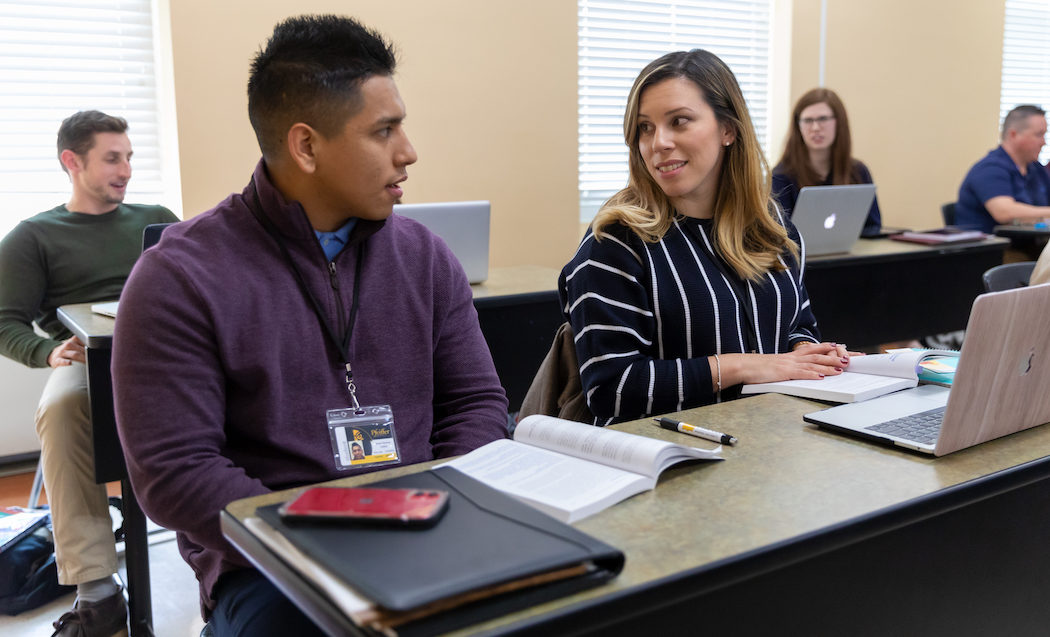- Program Goals, Competencies, and Learning Outcomes
- Accreditation
- Mission and EMBRACE Statement
- NCCPA PANCE Pass Rates
- Program Goals, Competencies, and Learning Outcomes
- Program Description and Curriculum
- Attrition Data
- Admissions
- Campus Location
- MS-PAS Information Sessions
- Technical Standards
- Tuition and Fees
- Faculty and Staff
- Program Policies
- Physician Assistant Studies – MS-PAS
Program Goals
The program goals of the Pfeiffer University Master of Science in Physician Assistant Studies with respective measurements of success are as follows:

Learning Competencies & Learning Outcomes
Competencies:
- Medical Knowledge (MK)
- Interpersonal Skills (IS)
- Clinical and Technical Skills (CTS)
- Professional Behaviors (PB)
- Clinical Reasoning and Problem-Solving Abilities (CRPSA)
| LEARNING OUTCOMES | DESCRIPTION | ALIGNED/SUPPORTED COMPETENCY |
|---|---|---|
| PLO1 | Demonstrate core knowledge of biomedical and clinical sciences across the lifespan. | Medical Knowledge |
| PLO2 | Demonstrate the application of core knowledge of biomedical and clinical sciences to the practice of medicine. | Medical Knowledge, Clinical and Technical Skills, Clinical Reasoning and Problem-Solving Abilities |
| PLO3 | Accurately obtain and document complete and problem-focused medical histories. | Medical Knowledge, Interpersonal Skills, Clinical and Technical Skills |
| PLO4 | Appropriately perform complete and problem-focused physical exams. | Medical Knowledge, Interpersonal Skills, Clinical and Technical Skills, Clinical Reasoning and Problem-Solving Abilities |
| PLO5 | Appropriately select and interpret laboratory and diagnostic studies common to general practice. | Medical Knowledge, Clinical and Technical Skills, Clinical Reasoning and Problem-Solving Abilities |
| PLO6 | Accurately generate differential diagnoses through investigative and critical thinking. | Medical Knowledge, Clinical Reasoning and Problem-Solving Abilities |
| PLO7 | Differentiate acute and emergent conditions from routine, preventative, and chronic encounters. | Medical Knowledge, Clinical and Technical Skills, Clinical Reasoning and Problem-Solving Abilities |
| PLO8 | Formulate appropriate pharmacologic and non-pharmacologic treatment plans for acute and chronic conditions. | Medical Knowledge, Clinical and Technical Skills, Clinical Reasoning and Problem-Solving Abilities |
| PLO9 | Provide health care services and education aimed at disease prevention and health maintenance. | Interpersonal Skills, Medical Knowledge, Clinical Reasoning and Problem-Solving Abilities |
| PLO10 | Incorporate ethical principles into the provision of care. | Interpersonal Skills, Professional Behaviors |
| PLO11 | Consider an individual’s unique identity and determinants of health during encounters with patients, family members, and coworkers. | Interpersonal Skills, Professional Behaviors |
| PLO12 | Appraise literature and apply principles of evidence-based medicine to patient care. | Medical Knowledge, Clinical Reasoning and Problem-Solving Abilities |
| PLO13 | Collaborate with members of the interprofessional healthcare team to provide patient centered care. | Interpersonal Skills, Professional Behaviors |
| PLO14 | Communicate effectively with patients, families, communities, and other healthcare professionals. | Interpersonal Skills, Professional Behaviors |
| PLO15 | Apply knowledge of the business of healthcare to individual patient care needs. | Medical Knowledge, Professional Behaviors, Clinical Reasoning and Problem-Solving Abilities |
| PLO16 | Recognize external and internal factors and other determinants of health that may impact differences in a patient’s access to healthcare. | Interpersonal Skills, Professional Behaviors |
| PLO17 | Perform procedures commonly encountered in professional practice. | Medical Knowledge, Clinical and Technical Skills |
| PLO18 | Promote a safe environment for patient care that incorporates prevention of medical errors. | Medical Knowledge, Clinical and Technical Skills, Professional Behaviorsiors |
